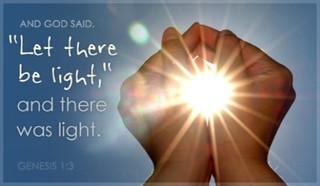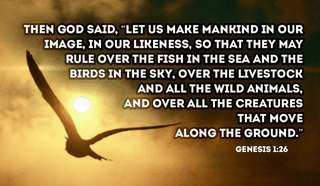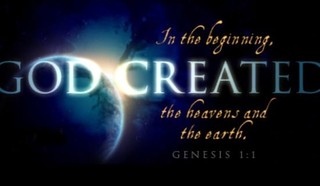
- Recent Translations
- All Translations
Videos for Génesis 1:21
Génesis 1:21 Meaning and Commentary
And God created great whales
Which the Targums of Jonathan and Jarchi interpret of the Leviathan and its mate, concerning which the Jews have many fabulous things: large fishes are undoubtedly meant, and the whale being of the largest sort, the word is so rendered. Aelianus, from various writers, relates many things of the extraordinary size of whales; of one in the Indian sea five times bigger than the largest elephant, one of its ribs being twenty cubits F18; from Theocles, of one that was larger than a galley with three oars F19; and from Onesicritus and Orthagoras, of one that was half a furlong in length F20; and Pliny F21 speaks of one sort called the "balaena", and of one of them in the Indian sea, that took up four aces of land, and so Solinus F23; and from Juba, he relates there were whales that were six hundred feet in length, and three hundred sixty in breadth F24 but whales in common are but about fifty, seventy, eighty, or at most one hundred feet. Some interpret these of crocodiles, see ( Ezekiel 29:3 ) some of which are twenty, some thirty, and some have been said to be an hundred feet long F25 The word is sometimes used of dragons, and, if it has this sense here, must be meant of dragons in the sea, or sea serpents, leviathan the piercing serpent, and leviathan the crooked serpent, ( Isaiah 27:1 ) so the Jews F26; and such as the bishop of Bergen F1 speaks of as in the northern seas of a hundred fathom long, or six hundred English feet; and who also gives an account of a sea monster of an enormous and incredible size, that sometimes appears like an island at a great distance, called "Kraken" {b}; now because creatures of such a prodigious size were formed out of the waters, which seemed so very unfit to produce them; therefore the same word is here made use of, as is in the creation of the heaven and the earth out of nothing, ( Genesis 1:1 ) because this production, though not out of nothing, yet was an extraordinary instance of almighty power. And every living creature that moveth, which the waters brought
forth abundantly after their kind;
that is, every living creature that swims in the waters of the great sea, or in rivers, whose kinds are many, and their numbers not to be reckoned; (See Gill on Genesis 1:20) and every winged fowl after his kind;
every fowl, and the various sorts of them that fly in the air; these were all created by God, or produced out of the water and out of the earth by his wonderful power: and God saw [that it was] good;
or foresaw that those creatures he made in the waters and in the air would serve to display the glory of his perfections, and be very useful and beneficial to man, he designed to create. (Some of the creatures described by the ancients must refer to animals that are now extinct. Some of these may have been very large dinasours. Ed.)
F18 Hist. Animal. l. 16. c. 12.
F19 Ib. l. 17. c. 6.
F20 Ibid.
F21 Nat. Hist. l. 9. c. 3.
F23 Polyhistor. c. 65.
F24 Plin. Nat. Hist. l. 32. c. 1.
F25 See Thevenot's Travels, par. 1. c. 72. p. 246. Harris's Voyages, &c. vol. 1. p. 287, 485, 759.
F26 T. Bab. Bava Bathra, fol. 74. 2.
F1 History of Norway, p. 199.
F2 Ibid. p. 210



